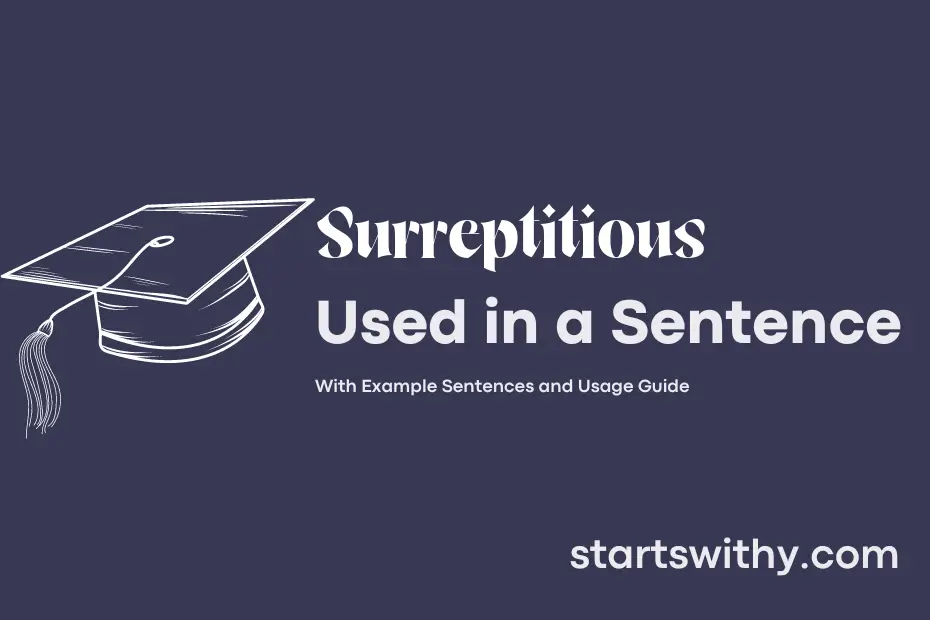Have you ever encountered a surreptitious action – something done secretly or sneakily without others knowing? The word “surreptitious” describes behavior that is concealed or furtive, often implying a sense of slyness or deceitfulness.
In everyday life, surreptitious actions can range from a sneaky glance during a game of hide-and-seek to clandestine operations carried out by spies. This term is commonly used to describe behaviors that are done in a way that is not easily detected or noticed by others, adding an element of secrecy or mystery to the action.
7 Examples Of Surreptitious Used In a Sentence For Kids
- She took a surreptitious bite of chocolate when no one was looking.
- The cat made a surreptitious move to catch the mouse.
- He hid a surreptitious note in his friend’s bag as a surprise.
- The squirrel made a surreptitious grab for the nut and ran away.
- The little girl gave her friend a surreptitious wink during class.
- The bird flew away with a surreptitious glance at the breadcrumbs.
- He whispered a surreptitious secret to his sister with a mischievous smile.
14 Sentences with Surreptitious Examples
- She made a surreptitious entrance into the library to return her overdue books.
- During exams, he would sneak surreptitious glances at his neighbor’s paper.
- The group of friends planned a surreptitious midnight snack run to the nearby street food vendor.
- She passed a surreptitious note to her friend during the boring lecture.
- He made a surreptitious phone call to his crush when he thought no one was looking.
- The college students shared surreptitious whispers during the professor’s lecture.
- They came up with a surreptitious code to communicate about the upcoming surprise party.
- The student made a surreptitious attempt to peek at the answer key during the test.
- The friends met at a surreptitious spot on campus to plan their weekend getaway.
- She made a surreptitious purchase of snacks from the canteen without anyone noticing.
- He pulled off a surreptitious switch of seats to sit next to his crush in the auditorium.
- The group of friends orchestrated a surreptitious prank involving a fake spider in the classroom.
- She executed a surreptitious plan to borrow her roommate’s clothes without asking.
- The college students engaged in surreptitious gossip about their classmates in the hallway.
How To Use Surreptitious in Sentences?
Surreptitious means done, made, or acquired by stealth or secretly. When using this word in a sentence, it is important to ensure that you are describing something that is sneaky or secretive in nature.
Here is an example of how to use surreptitious in a sentence: “She made a surreptitious entrance into the party, hoping no one would notice her late arrival.”
To use surreptitious effectively in a sentence, consider the context in which you are using it. Think about actions or behaviors that are done in a secretive or stealthy manner. It can describe anything from a secretive glance to a covert operation.
When crafting a sentence with surreptitious, it can be helpful to provide some context or background information to clarify why the action is secretive or stealthy. This will help the reader better understand the use of the word in the sentence.
In summary, when using surreptitious in a sentence, make sure the action or behavior you are describing is done in a secretive or sneaky manner. Providing context and background information can further enhance the understanding of the word in the sentence.
Conclusion
In conclusion, sentences using the word “surreptitious” often describe actions or behaviors that are secretive, sneaky, or done in a hidden manner. This term implies a sense of secrecy or stealth in any covert or furtive activities. For instance, someone might engage in surreptitious behavior by secretly listening in on a private conversation or stealing glances at a confidential document. This word carries a connotation of deceitfulness or deceptiveness, as the actions described are usually done without others’ knowledge or consent.
Overall, the word “surreptitious” provides a vivid description of actions that are carried out in a sly or concealed way, adding intrigue or mystery to the situation. By using this term in sentences, writers can effectively convey the sense of secrecy or underhandedness associated with various behaviors or activities.



